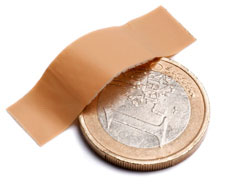
Economists are being too alarmist when considering the fate of the Eurozone, says Benjamin Tal, managing director of CIBC.
They’re not distinguishing between a recession and a collapse, which is stoking investors’ fears.
Europe as a whole is currently in a recession, with Spain, Italy and France currently struggling. These countries, among others, desperately need to lower their budget deficits, and are unlikely to improve in the near future.
“A collapse, however, would have very serious consequences,” says Tal. “So, an important question remains: Are we facing a collapse of the entire Eurozone system?”
He says this won’t happen, because Germany and the European Central Bank won’t allow it. “The cost of a Eurozone collapse would be so significant that both will do whatever it takes to prevent the downfall of the European economy.”
They will provide liquidity as needed and may go to such lengths as printing money and buying bonds directly to help boost the financial system if necessary, mirroring the efforts of the Federal Reserve in its fight to keep the U.S. afloat.
“They will do whatever it takes to buy time for countries like Spain and Italy, so they can find their footing,” he says. “We will continue to see volatility, but it’s not a collapse, the cost of which would be too high to bear.”
Tal also says China is slowing down because it wants to; over the past year, the economy was rising too quickly and inflation rose by 600%. Many investors and analysts, however, worry its economy is slowing too rapidly.
China is trying to revive its economy by lowering debt requirements and, most likely, by also cutting interest rates. Tal expects that Chinese banks will be allowed to lend again.
“A hard landing, of growth around 7%, would be devastating for the global economy,” he adds. “The good news is the Chinese economy has already moved toward stimulating the economy and will help the country accomplish a soft landing.”
But there’s still room for caution.
“Even a soft landing can’t be very soft on commodity prices,” Tal says. “We’ll remain defensive on the currency market for the next year.”